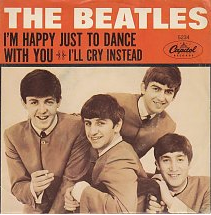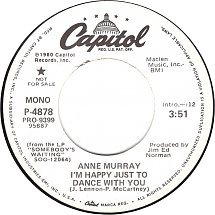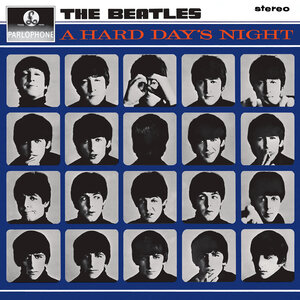
A Hard Day's Night is the third studio album by the English rock band the Beatles, released on 10 July 1964 by Parlophone, with side one containing songs from the soundtrack to their film of the same name. The American version of the album was released two weeks earlier, on 26 June 1964 by United Artists Records, with a different track listing that included selections from George Martin's film score. In contrast to the Beatles' first two albums, all 13 tracks on A Hard Day's Night were written by John Lennon and Paul McCartney, showcasing the development of their songwriting partnership.
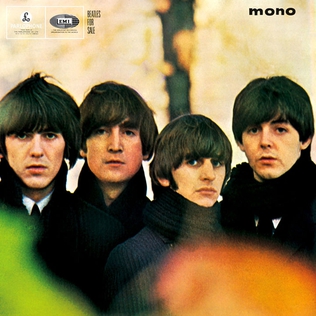
Beatles for Sale is the fourth studio album by the English rock band the Beatles. It was released on 4 December 1964 in the United Kingdom on EMI's Parlophone label. The album marked a departure from the upbeat tone that had characterised the Beatles' previous work, partly due to the band's exhaustion after a series of tours that had established them as a worldwide phenomenon in 1964. Beatles for Sale was not widely available in the US until 1987, when the Beatles' catalogue was standardised for release on CD. Instead, eight of the album's fourteen tracks appeared on Capitol Records' concurrent release, Beatles '65, issued in North America only.
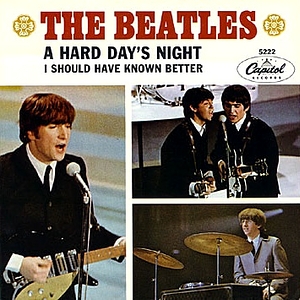
"A Hard Day's Night" is a song by the English rock band the Beatles. Credited to Lennon–McCartney, it was primarily written by John Lennon, with some minor collaboration from Paul McCartney. It was released on the film soundtrack of the same name in 1964. It was also released as a single in the UK, and in the US

Something New is an album by English rock band the Beatles, released in 1964 for the North American market only.
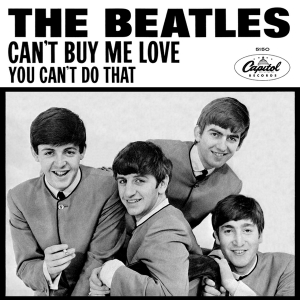
"Can't Buy Me Love" is a song by the English rock band the Beatles that was released in March 1964 as the A-side of their sixth single. It was written by Paul McCartney and credited to the Lennon–McCartney partnership. The song was included on the group's album A Hard Day's Night and was featured in a scene in Richard Lester's film of the same title. The single topped charts in the United Kingdom, the United States, Canada, Australia, Ireland, New Zealand, South Africa, the Netherlands, France and Sweden. In the UK, it was the fourth highest selling single of the 1960s.

"You Won't See Me" is a song by the English rock band the Beatles from their 1965 album Rubber Soul. It was written by Paul McCartney and credited to Lennon–McCartney. As with songs such as "We Can Work It Out" and "I'm Looking Through You" from the same period, the lyrics address McCartney's troubled relationship with Jane Asher and her desire to pursue her career as a stage and film actress. The Beatles recorded the song during what author Mark Lewisohn describes as a "marathon" final recording session for Rubber Soul, to ensure the album's pre-Christmas release.
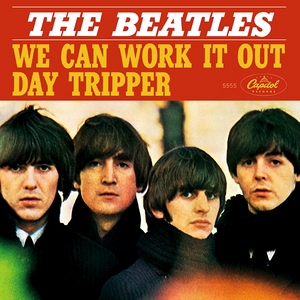
"Day Tripper" is a song by the English rock band the Beatles that was released as a double A-side single with "We Can Work It Out" in December 1965. The song was written primarily by John Lennon with some contributions from Paul McCartney and was credited to the Lennon–McCartney partnership. Both songs were recorded during the sessions for the band's Rubber Soul album. The single topped charts in Britain, Ireland, the Netherlands and Norway. In the United States, "Day Tripper" peaked at number five on the Billboard Hot 100 chart and "We Can Work It Out" held the top position.

"I Feel Fine" is a song by the English rock band the Beatles that was released in November 1964 as the A-side of their eighth single. It was written by John Lennon and credited to the Lennon–McCartney partnership. The recording includes one of the earliest uses of guitar feedback in popular music.
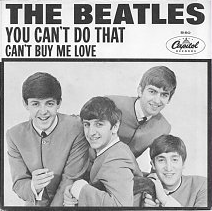
"You Can't Do That" is a song written by John Lennon and released by the English rock band the Beatles as the B-side of their sixth British single "Can't Buy Me Love". It was later released on their third UK album A Hard Day's Night (1964). A live rendition of the song was released on the 2016 re-release of The Beatles at the Hollywood Bowl.
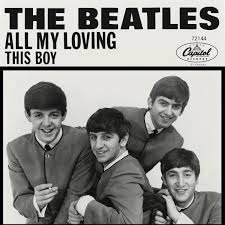
"This Boy" is a song by the English rock band the Beatles, written by John Lennon (credited to Lennon–McCartney). It was released in November 1963 as the B-side of the band's Parlophone single "I Want to Hold Your Hand". In the United States, it was issued in January 1964 on Meet the Beatles! which was Capitol Records' reconfigured version of the With the Beatles album. The Beatles performed the song live on 16 February 1964 for their second appearance on The Ed Sullivan Show. An instrumental easy listening arrangement by George Martin, re-titled "Ringo's Theme (This Boy)", was featured in the film A Hard Day's Night and the United Artists soundtrack album. This version was also issued as a single, reaching number 53 in the US and number one in Canada.
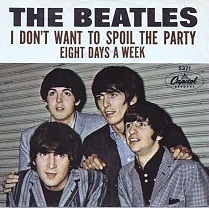
"I Don't Want to Spoil the Party" is a song by the English rock band the Beatles, written by John Lennon and credited to Lennon–McCartney. It was released on the album Beatles for Sale in the United Kingdom in December 1964. "I Don't Want to Spoil the Party" was also released on the Beatles for Sale EP.
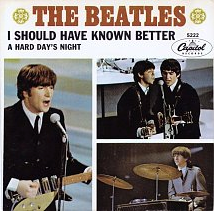
"I Should Have Known Better" is a song by English rock band the Beatles composed by John Lennon, and originally issued on A Hard Day's Night, their soundtrack for the film of the same name released on 10 July 1964. "I Should Have Known Better" was also issued as the B-side of the US single "A Hard Day's Night" released on 13 July. An orchestrated version of the song conducted by George Martin appears on the North American version of the album, A Hard Day's Night Original Motion Picture Soundtrack.

"If I Fell" is a song by English rock band the Beatles which first appeared in 1964 on the album A Hard Day's Night in the United Kingdom and United States, and on the North American album Something New. It was written primarily by John Lennon and credited to Lennon–McCartney. "That's my first attempt at a ballad proper. ... It shows that I wrote sentimental love ballads way back when", Lennon stated in his 1980 Playboy interview. Paul McCartney stated that he contributed to the song: "We wrote 'If I Fell' together."
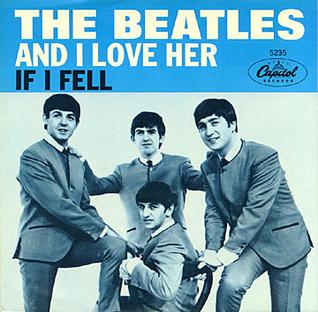
"And I Love Her" is a song recorded by English rock band the Beatles, written primarily by Paul McCartney and credited to the Lennon–McCartney partnership. It is the fifth track of their third UK album A Hard Day's Night and was released 20 July 1964, along with "If I Fell", as a single release by Capitol Records in the United States, reaching No. 12 on the Billboard Hot 100.
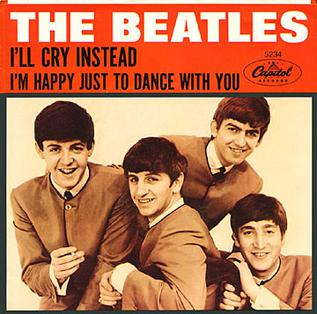
"I'll Cry Instead" is a song written by John Lennon, and recorded by the English rock band the Beatles for their third studio album, A Hard Day's Night (1964), a part-studio and part-soundtrack album to their film of the same name (1964). In the United States, the song originally appeared in the US version of A Hard Day's Night before it was released as a single backed with "I'm Happy Just to Dance with You" along with the US album Something New.
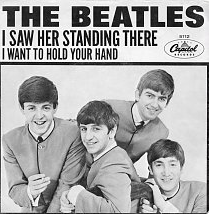
"I Saw Her Standing There" is a song by the English rock band the Beatles, written by Paul McCartney and John Lennon. It is the opening track on the band's 1963 debut UK album Please Please Me and their debut US album Introducing... The Beatles.
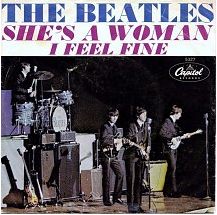
"She's a Woman" is a song by the English rock band the Beatles, written primarily by Paul McCartney and credited to Lennon–McCartney. It was released on a non-album single in November 1964 as the B-side to "I Feel Fine", except in North America, where it also appeared on the album Beatles '65, released in December 1964. Though it was the B-side, it charted in the US, reaching number four on the Billboard Hot 100 and number eight on the Cash Box Top 100. The song originated in McCartney's attempt to write a song in the style of Little Richard. The lyrics include the first reference to drugs in a Beatles song, with the line "turn(s) me on" referring to marijuana.
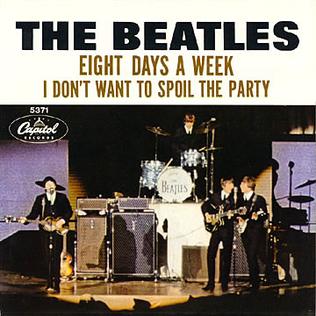
"Eight Days a Week" is a song by the English rock band the Beatles. It was written by Paul McCartney and John Lennon based on McCartney's original idea. The song was released in the United Kingdom in December 1964 on the album Beatles for Sale. In the United States, it was first issued as a single in February 1965 before appearing on the North American release Beatles VI. The song was the band's seventh number 1 single on the Billboard Hot 100, a run of US chart success achieved in just over a year. The single was also number 1 in Canada, Belgium and the Netherlands.

"Komm, gib mir deine Hand" and "Sie liebt dich" are German-language versions of "I Want to Hold Your Hand" and "She Loves You", respectively, by the English rock band the Beatles. Both John Lennon and Paul McCartney wrote the original English songs, credited to the Lennon–McCartney partnership, while Camillo Felgen wrote the translated German lyrics. Felgen is credited under several of his pen names. In places, his translations take major liberties with the original lyrics. Odeon Records released the German versions together as a non-album single in West Germany in March 1964. Swan Records released "Sie liebt dich", along with the original "She Loves You" B-side "I'll Get You", as a single in the United States in May 1964. Capitol included "Komm, gib mir deine Hand" as the closing track of the 1964 North American-only album Something New.

"Got to Get You into My Life" is a song by the English rock band the Beatles, first released in 1966 on their album Revolver. It was written by Paul McCartney and credited to Lennon–McCartney. The song is a homage to the Motown Sound, with colourful brass instrumentation and lyrics that suggest a psychedelic experience. "It's actually an ode to pot," McCartney explained. A cover version by Cliff Bennett and the Rebel Rousers, produced by McCartney, peaked at number six in 1966 in the UK. The song was issued in the United States as a single from the Rock 'n' Roll Music compilation album in 1976, six years after the Beatles disbanded. Another cover version by Earth, Wind & Fire from the Sgt. Pepper's Lonely Hearts Club Band film soundtrack peaked at number nine in the US in 1978.
